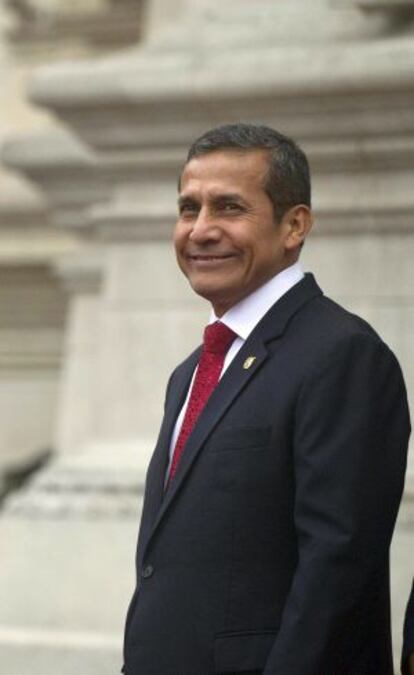Mining conflict and captured fugitive scandal take toll on Peruvian leader
Humala's approval ratings plummet as citizens criticize his handling of controversies

A mining conflict and questions concerning his relationship with a businessman facing corruption charges who was recently captured in Bolivia have taken a toll on Peruvian President Ollanta Humala as he prepares to begin his last year in office.
According to the GfK polling firm, 77 percent of Peruvians disapprove of the way Humala has been managing his government – an eight-percent rise from the last survey taken in April.
The 52-year-old leader was swept into office in 2011 campaigning on a nationalist ticket. His Gana Peru party had been considered leftwing, but his style of government is more in keeping with the center right. Under the Constitution, Humala is barred from running for a consecutive term next year.
Two recent controversies have put Humala in the eye of a political hurricane in his own country.
“Humala has two very complicated fronts and little leeway to manage them,” said GfK polling director Hernán Chaparro.
First, the president has had to deal with a series of violent conflicts that have emerged in Peru’s southern Isaly province over the government’s plans to open a copper mine, known as Tía María, with financing from Mexican firm Southern Copper.
Humala is opposed to the European Union carrying out an environmental impact study
Residents in the nearby Tambo agricultural valley and environmentalists have been against the project from the beginning because the mining company plans to use water from the nearby Tambo River.
The government has said the mine could produce around 120,000 tons of copper annually and money would go back into the province by way of direct investments. But opponents are not convinced.
In 2011, violent protests broke out between police and demonstrators in the region that took the lives of three civilians, and last March, provincial government leaders, including local mayors, called an indefinite strike.
An environmental impact study, which was commissioned by environmentalists and local leaders, states that copper extraction would affect local rice and garlic production as well as the tuna industry.
Last month, more violent protests occurred, which left three people and a police officer dead, prompting Humala on May 22 to declare a state of emergency in the province. This has forced many of the protest leaders to flee to the city of Arequipa to avoid being arrested.
Belaunde is being held in a maximum security prison following his extradition from Bolivia
Óscar González Rocha, the executive president of Southern Copper, announced a two-month freeze on the project so that company officials could give people in the province more information about the Tía María mine.
In a recent television interview, González Rocha acknowledged that “something was probably wrong” in this case.
Meanwhile, Yamila Osorio, the regional governor of Arequipa, said the European Union was willing to finance a second environmental impact study, but the Humala government is opposed to such a move.
If the Tía María controversy has battered Humala’s image, his reputation has been further damaged by the recent escape and capture of Peruvian businessman Martín Belaunde Lossio, who fled the country after he was charged with corruption and money laundering.
After months trying to fight extradition from neighboring Bolivia, Belaunde was turned over to Peruvian authorities on Friday. He was on the run for five days, trying to reach the Brazilian border, after he escaped from house arrest in La Paz.
He is now being held at a maximum security prison in Lima.
Belaunde was Humala’s campaign chief during his unsuccessful presidential bid in 2006. He later served as an advisor during the 2011 race, which Humala won.
Until the corruption allegations emerged regarding Belaunde receiving illegal public contracts, his former partner and wife of his children, Roxana Altuna, was a chief advisor to first lady Nadine Heredia. Altuna resigned in November after her name also surfaced in the investigation.
Belaunde, who has had an outstanding arrest warrant since May 2014, was charged in connection with a criminal enterprise allegedly run by the former president of Ancash region. He is also being investigated for representing a Spanish company, Antalsis, which obtained million-dollar government contracts for work that was never completed.
Tu suscripción se está usando en otro dispositivo
¿Quieres añadir otro usuario a tu suscripción?
Si continúas leyendo en este dispositivo, no se podrá leer en el otro.
FlechaTu suscripción se está usando en otro dispositivo y solo puedes acceder a EL PAÍS desde un dispositivo a la vez.
Si quieres compartir tu cuenta, cambia tu suscripción a la modalidad Premium, así podrás añadir otro usuario. Cada uno accederá con su propia cuenta de email, lo que os permitirá personalizar vuestra experiencia en EL PAÍS.
¿Tienes una suscripción de empresa? Accede aquí para contratar más cuentas.
En el caso de no saber quién está usando tu cuenta, te recomendamos cambiar tu contraseña aquí.
Si decides continuar compartiendo tu cuenta, este mensaje se mostrará en tu dispositivo y en el de la otra persona que está usando tu cuenta de forma indefinida, afectando a tu experiencia de lectura. Puedes consultar aquí los términos y condiciones de la suscripción digital.








































